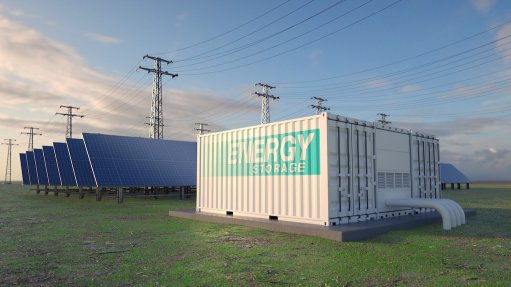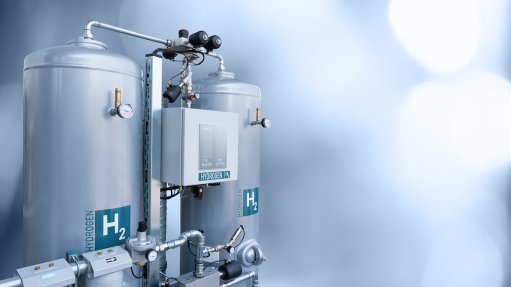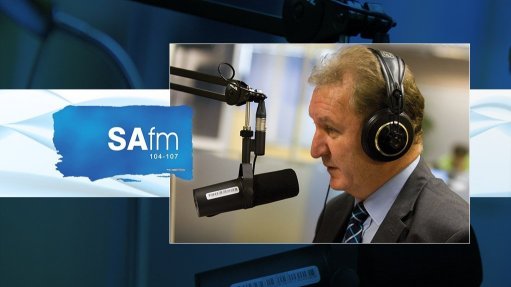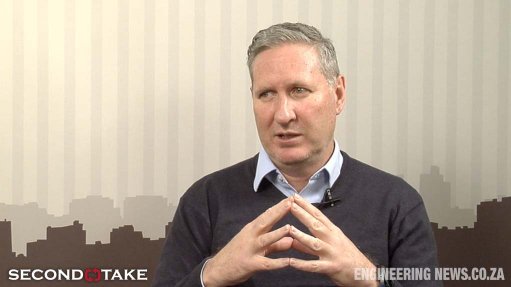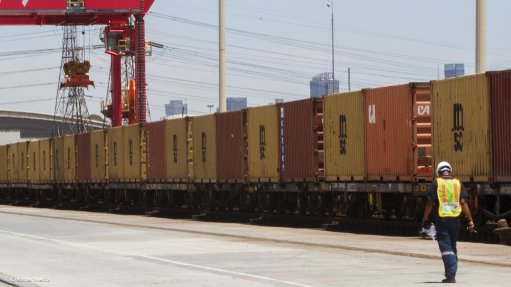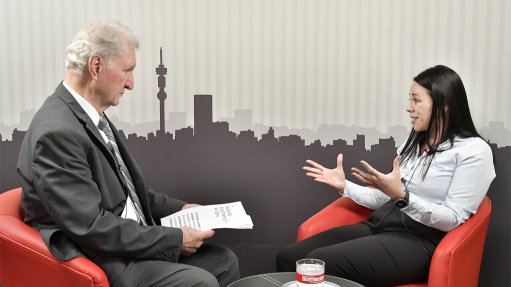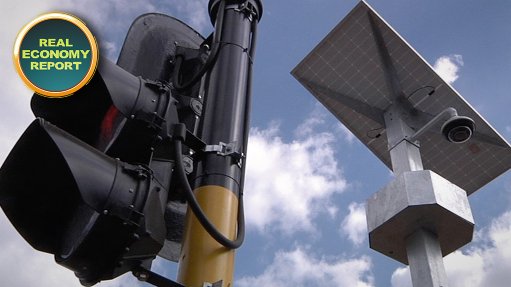Ramaphosa hints at yet more reforms as he predicts ‘massive investment’ in wake of electricity amendment

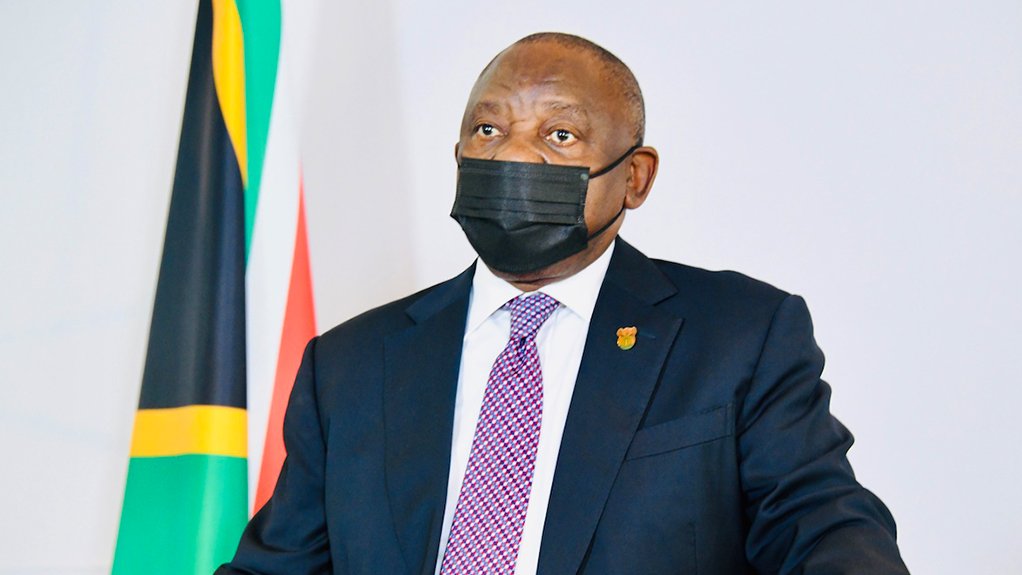
President Cyril Ramaphosa in a face mask as he prepares to answer questions during a hybrid sitting of Parliament on Friday
President Cyril Ramaphosa has described a recently gazetted amendment to Schedule 2 of the Electricity Regulation Act, opening the way for sub-100-MW grid-tied embedded generators to supply one or more customers, without needing a licence, as a “defining moment in energy generation in our country”.
Responding to a Parliamentary question on the progress being made on government’s Economic Reconstruction and Recovery Plan (ERRP), the President said that the reform, which was implemented in August, had been “widely welcomed, not only in our country, but also globally”.
“This will not only alleviate the immediate energy supply shortfall, but will lead to massive investment in new projects and stimulate growth.”
In a recent briefing to Parliament’s Standing Committee on Appropriations, Operation Vulindlela's Dr Sean Phillips said the amendment represented the “quickest way of getting additional electricity into the system”, as no public procurement process would be required.
Operation Vulindlela, a joint initiative of The Presidency and the National Treasury, has been tasked with accelerating the implementation of structural reforms that have been approved but never implemented.
“It’s estimated that this could result in an additional 5 000 MW of electricity coming into the system over the next couple of years and an additional R60- to R70-billion-worth of investment by the private sector into electricity generation,” Phillips said.
In his reply, meanwhile, Ramaphosa argued that the amendment would also provide certainty to investors that the country’s current electricity challenges would be resolved, “enabling them as investors to confidently invest in new factories, mines and a whole number of other initiatives, such as data centres”.
The amendment and the July announcement that the National Ports Authority would be established as an independent subsidiary of Transnet were held up by the President as two examples that the ERRP was being converted from a “blueprint into a reality”.
He said that work was under way in a number of other reform areas, including in the communications, water and tourism sectors that would “show results over the coming months”.
“Discussions between the Independent Communications Authority (Icasa) and various roleplayers and licensees have been under way with the hope of reaching a settlement to enable the allocation of high-demand broadband spectrum to continue.
“I call on those who are part of this process, working together with Minister Khumbudzo Ntshavheni and Icasa, to reach agreement. I would call on the litigants to seek a solution, so that we can put this matter to bed and open up our economy.”
Besides structural reforms, Ramaphosa was also bullish on prospects for scaling up the Presidential Employment Stimulus, which he said had supported close to 700 000 job opportunities to date.
“A further R11-billion has been allocated to continue the job stimulus in the current financial year, and several programmes will begin implementation in the coming weeks.”
The President acknowledged that recovery from the blow dealt by Covid-19 had been set back by recent deadly incidents of rioting and looting in Gauteng and KwaZulu-Natal, which had cost the economy R50-billion, before the extension of additional measures to provide relief to affected businesses and communities.
Together with Covid-19, the rioting had contributed to deepening unemployment, which had risen to a record 34.4% on the narrow definition in the second quarter of 2021, and posed a significant risk to future social stability.
“The statistics released for the second quarter of this year are a reminder of our unemployment crisis and the extent of poverty in our country.
“While the interventions contained in our reconstruction and recovery plan are necessary and significant, I will say now that they are not enough.
“The time has now come for us to assess how far we have come, to reflect on the choices that confront us as a nation, and to take bold actions to achieve economic progress.
“That is the singular focus of my mission and the mission of this government – and we will be articulating this in time to come,” Ramaphosa told lawmakers during a hybrid session of Parliament.
JOB-KILLING POLICIES
The Democratic Alliance’s John Steenhuisen, who is leader of the official opposition, was scathing in his assessment of government’s approach to the economy, describing the interventions as “mad, job-killing policies”.
“It’s very clear from your answer in the house today that you have no idea how to create employment, because you live in a billionaire’s bubble disconnected from the real world.
“Let’s be very clear, this is not a pandemic problem, it’s a Presidential and policy problem,” Steenhuisen said, while calling on Ramaphosa to apologise to the youth for government’s failure to provide jobs for them.
The President insisted that government was not afraid to confront the reality of unemployment and poverty.
“We are up to it.
“The reforms that we have embarked upon, and the further reforms that are going to ensue, are aimed at precisely ensuring that we create a broad spectrum of job opportunities for the young people of our country and to support business to be able to create jobs and erode what has not worked well in the past.”
In a supplementary question, Economic Freedom Fighters MP Ciliesta Motsepe blamed the poor state of the economy on austerity measures, which had resulted in the cutting of budgets, services and jobs, including at State-owned companies such as South African Airways and Denel.
Ramaphosa responded by highlighting the country’s debt burden, which had resulted in yearly interest payments that rivalled the budgets of health and education, hitherto the two largest expenditure items.
“The needs and requirements are often way above what we have as resources and that is what is leading to prioritisation [of expenditure],” Ramaphosa argued.
Comments
Press Office
Announcements
What's On
Subscribe to improve your user experience...
Option 1 (equivalent of R125 a month):
Receive a weekly copy of Creamer Media's Engineering News & Mining Weekly magazine
(print copy for those in South Africa and e-magazine for those outside of South Africa)
Receive daily email newsletters
Access to full search results
Access archive of magazine back copies
Access to Projects in Progress
Access to ONE Research Report of your choice in PDF format
Option 2 (equivalent of R375 a month):
All benefits from Option 1
PLUS
Access to Creamer Media's Research Channel Africa for ALL Research Reports, in PDF format, on various industrial and mining sectors
including Electricity; Water; Energy Transition; Hydrogen; Roads, Rail and Ports; Coal; Gold; Platinum; Battery Metals; etc.
Already a subscriber?
Forgotten your password?
Receive weekly copy of Creamer Media's Engineering News & Mining Weekly magazine (print copy for those in South Africa and e-magazine for those outside of South Africa)
➕
Recieve daily email newsletters
➕
Access to full search results
➕
Access archive of magazine back copies
➕
Access to Projects in Progress
➕
Access to ONE Research Report of your choice in PDF format
RESEARCH CHANNEL AFRICA
R4500 (equivalent of R375 a month)
SUBSCRIBEAll benefits from Option 1
➕
Access to Creamer Media's Research Channel Africa for ALL Research Reports on various industrial and mining sectors, in PDF format, including on:
Electricity
➕
Water
➕
Energy Transition
➕
Hydrogen
➕
Roads, Rail and Ports
➕
Coal
➕
Gold
➕
Platinum
➕
Battery Metals
➕
etc.
Receive all benefits from Option 1 or Option 2 delivered to numerous people at your company
➕
Multiple User names and Passwords for simultaneous log-ins
➕
Intranet integration access to all in your organisation







